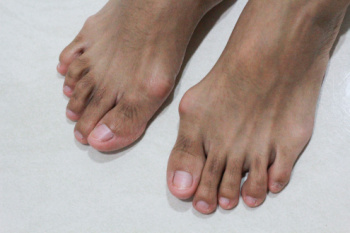Items filtered by date: March 2024
Causes, Symptoms, and Treatment of Bunions

Bunions, technically known as hallux valgus, are bony bumps that form at the base of the big toe joint. They are caused by a structural problem within the foot bones, often the metatarsophalangeal, or MTP, joint. This causes the big toe to angle toward the second toe instead of pointing straight ahead, leading to discomfort and mobility issues. While genetics play a role in the development of bunions, factors like overpronation, foot injuries, arthritis, and nerve or muscle conditions can contribute to bunion development. Symptoms include pain, inflammation, and difficulty wearing certain shoes. Conservative treatment, like supportive footwear and pain-relieving medication, are initial options. Cortisone injections may be used for swelling and pain. However, when conservative measures fail, surgical intervention may be necessary to realign the joint and relieve pain. Bunion surgery is typically reserved for severe cases where pain and deformity persist despite other treatments. If you're experiencing bunion pain, it is suggested that you make an appointment with a podiatrist who can provide personalized treatment options.
If you are suffering from bunions, contact Wendy K. Stinson, DPM of New Jersey. Our doctor can provide the care you need to keep you pain-free and on your feet.
What Is a Bunion?
A bunion is formed of swollen tissue or an enlargement of boney growth, usually located at the base joint of the toe that connects to the foot. The swelling occurs due to the bones in the big toe shifting inward, which impacts the other toes of the foot. This causes the area around the base of the big toe to become inflamed and painful.
Why Do Bunions Form?
Genetics – Susceptibility to bunions are often hereditary
Stress on the feet – Poorly fitted and uncomfortable footwear that places stress on feet, such as heels, can worsen existing bunions
How Are Bunions Diagnosed?
Doctors often perform two tests – blood tests and x-rays – when trying to diagnose bunions, especially in the early stages of development. Blood tests help determine if the foot pain is being caused by something else, such as arthritis, while x-rays provide a clear picture of your bone structure to your doctor.
How Are Bunions Treated?
- Refrain from wearing heels or similar shoes that cause discomfort
- Select wider shoes that can provide more comfort and reduce pain
- Anti-inflammatory and pain management drugs
- Orthotics or foot inserts
- Surgery
If you have any questions, please feel free to contact our office located in Parsippany-Troy Hills, NJ . We offer the newest diagnostic and treatment technologies for all your foot care needs.
Get Proper Treatment for Ankle Injuries
Causes of Big Toe Stiffness

The big toe, or hallux, is more than just a digit on your foot. It's essential for your daily activities, like walking, standing, and maintaining balance. However, stiffness in the big toe can severely impact mobility and comfort. Big toe stiffness, medically known as hallux rigidus, can stem from various factors. Most cases are of unknown origin, while others result from injuries damaging the joint's cartilage. Structural changes, like a shifted or bent first metatarsal, or even genetic predispositions, can contribute to its development. Additionally, conditions such as osteoarthritis, gout, or bunions can increase the risk of big toe stiffness. Pain, swelling, and redness around the joint, along with stiffness and reduced range of motion, are common symptoms. If you're experiencing symptoms of big toe stiffness, it's suggested that you make an appointment with a podiatrist, who can offer the appropriate treatment option.
Toe pain can disrupt your daily activities. If you have any concerns, contact Wendy K. Stinson, DPM of New Jersey. Our doctor can provide the care you need to keep you pain-free and on your feet.
What Causes Toe Pain?
Most severe toe pain is caused due to a sports injury, trauma from dropping something heavy on the toe, or bumping into something rigid. Other problems can develop over time for various reasons.
Toe pain can be caused by one or more ailments. The most common include:
- Trauma
- Sports injury
- Wearing shoes that are too tight
- Arthritis
- Gout
- Corns and calluses
- Hammertoe
- Bunions
- Blisters
- Ingrown toenails
- Sprains
- Fractures (broken bones)
- Dislocations
When to See a Podiatrist
- Severe pain
- Persistent pain that lasts more than a week
- Signs of infection
- Continued swelling
- Pain that prevents walking
Diagnosis
In many cases the cause of toe pain is obvious, but in others, a podiatrist may want to use more advanced methods to determine the problem. These can range from simple visual inspections and sensation tests to X-rays and MRI scans. Prior medical history, family medical history, and any recent physical traumatic events will all be taken into consideration for a proper diagnosis.
Treatment
Treatments for toe pain and injuries vary and may include shoe inserts, padding, taping, medicines, injections, and in some cases, surgery. If you believe that you have broken a toe, please see a podiatrist as soon as possible.
If you have any questions please feel free to contact our office located in Parsippany-Troy Hills, NJ . We offer the newest diagnostic tools and technology to treat your foot and ankle needs.
Causes of Foot Pain in the Elderly
 Foot pain is a common experience during the aging process. Common causes of foot pain in older people include changes in foot structure, decreased cushioning in the soles of the feet, and a natural reduction in skin elasticity. Conditions like arthritis, which become more prevalent with age, can contribute to joint pain and inflammation in the feet. Older people often experience lowered circulation and slower healing processes, which can make foot problems worse. Chronic conditions such as diabetes can also lead to neuropathy, causing tingling, numbness, and pain in the feet. It is important to choose the right footwear and practice good foot hygiene to prevent any additional pain. If you are experiencing foot pain as an older adult, it is suggested you consult with a podiatrist who can offer a diagnosis for foot pain and management techniques.
Foot pain is a common experience during the aging process. Common causes of foot pain in older people include changes in foot structure, decreased cushioning in the soles of the feet, and a natural reduction in skin elasticity. Conditions like arthritis, which become more prevalent with age, can contribute to joint pain and inflammation in the feet. Older people often experience lowered circulation and slower healing processes, which can make foot problems worse. Chronic conditions such as diabetes can also lead to neuropathy, causing tingling, numbness, and pain in the feet. It is important to choose the right footwear and practice good foot hygiene to prevent any additional pain. If you are experiencing foot pain as an older adult, it is suggested you consult with a podiatrist who can offer a diagnosis for foot pain and management techniques.
Foot Pain
Foot pain can be extremely painful and debilitating. If you have a foot pain, consult with Wendy K. Stinson, DPM from New Jersey. Our doctor will assess your condition and provide you with quality foot and ankle treatment.
Causes
Foot pain is a very broad condition that could be caused by one or more ailments. The most common include:
- Bunions
- Hammertoes
- Plantar Fasciitis
- Bone Spurs
- Corns
- Tarsal Tunnel Syndrome
- Ingrown Toenails
- Arthritis (such as Gout, Rheumatoid, and Osteoarthritis)
- Flat Feet
- Injury (from stress fractures, broken toe, foot, ankle, Achilles tendon ruptures, and sprains)
- And more
Diagnosis
To figure out the cause of foot pain, podiatrists utilize several different methods. This can range from simple visual inspections and sensation tests to X-rays and MRI scans. Prior medical history, family medical history, and any recent physical traumatic events will all be taken into consideration for a proper diagnosis.
Treatment
Treatment depends upon the cause of the foot pain. Whether it is resting, staying off the foot, or having surgery; podiatrists have a number of treatment options available for foot pain.
If you have any questions, please feel free to contact our office located in Parsippany-Troy Hills, NJ . We offer the newest diagnostic and treatment technologies for all your foot care needs.

